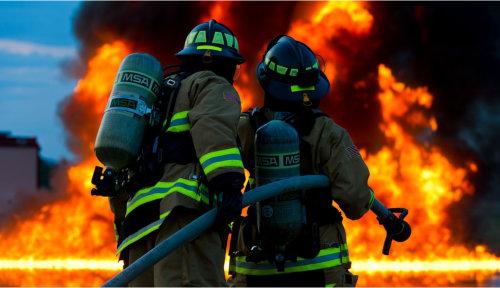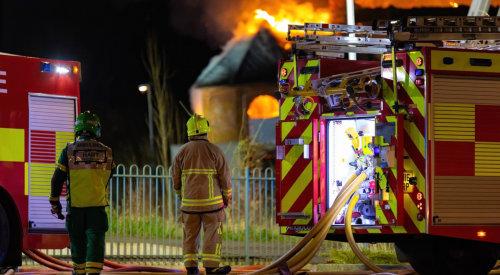A few years ago, a house in my town went up in flames. The mom was at work and her four children were home. By the time the emergency was called in, it was too late. That mom lost three of her four children in the fire. It was absolute devastation for that family and tragic
for our community.
The burned remnants of their house are still there. It's a constant reminder of how life can change in a matter of minutes. I heard that whatever they're going to do with that property is still in discussion.
October 8-14 is Fire Prevention Week. Every year, thousands of house fires occur, causing immeasurable damage to homes and tragic loss of life. The good news is that many house fires are preventable with the right knowledge and precautions.
Here are essential steps for preventing house fires and ensure the safety of your family.
1. Install Smoke Alarms: One of the simplest yet most effective ways to protect your home from fires is by installing smoke alarms. Ensure that you have smoke
detectors installed on every level of your home, including the basement and near sleeping areas.
Test them
monthly and replace batteries at least once a year. Modern smoke detectors are equipped with advanced features, such as carbon monoxide detection, which adds an extra layer of safety.
2. Create an Escape Plan: Having an escape plan is crucial in case a fire does break out. Sit down
with your family and create a detailed escape plan that includes multiple exit routes from each room.
Practice fire drills regularly, so everyone knows what to do in an emergency.
Designate a meeting point outside the home where everyone can gather to ensure everyone is safe.
3. Be Cautious with Cooking: Cooking is a leading cause of house fires. To prevent kitchen fires, never leave cooking unattended, and keep flammable materials like paper towels and
dishcloths away from the stove.
If a grease fire occurs, never use water to extinguish it. Instead, smother it with a lid or a fire extinguisher designed for grease fires. 4. Electrical Safety: Faulty electrical systems and devices can also start fires. Regularly inspect electrical cords for signs of wear and tear, and replace damaged cords immediately.
Avoid overloading outlets and use surge protectors to safeguard your electronics. If you notice flickering lights, circuit breakers tripping frequently, or other electrical issues, consult a professional electrician.
5. Maintain Heating Sources: Heating equipment, such as furnaces, space heaters, and fireplaces, can pose fire hazards if not properly maintained. Ensure that your heating system is inspected and serviced annually by a qualified technician.
Keep flammable materials at a safe distance from space heaters and ensure they are turned off when not in use. Use a fireplace screen to prevent sparks from escaping.
6. Store Flammable
Materials Safely: Many common household items, like gasoline, paint, and cleaning products, are highly flammable. Store these materials in a cool, dry place away from heat sources and open flames. Use proper containers with tightly sealed lids to prevent leaks.
7. Regularly Clean
Dryer Vents: Lint buildup in dryer vents is a common cause of house fires. Clean the lint trap after every load, and periodically check and clean the vent and duct behind the dryer. A clogged dryer vent can easily ignite and lead to a dangerous fire.
Never, ever leave your home when your dryer is running or when you're sleeping.
8. Install Fire Extinguishers: Keep fire extinguishers in key locations throughout your home, such as the kitchen, garage,
and near bedrooms. Learn how to use them and make sure they are regularly inspected and maintained.
9. Be Cautious with Candles: While candles can create a cozy atmosphere, they also pose a fire risk. Keep candles away from flammable materials, never leave them unattended, and
extinguish them before going to bed or leaving the room. To help ensure you remember to extinguish them, set an alarm on your phone to sound. Consider using battery-operated LED candles as a safer alternative.
House fires can devastate lives, but by taking proactive steps and following fire safety
guidelines, you can significantly reduce the risk of a fire occurring in your home.
During Fire Prevention Week and throughout the year, make it a priority to implement these tips and
educate your family on fire safety. Protecting your home and loved ones is a responsibility we all share, and it starts with prevention.












